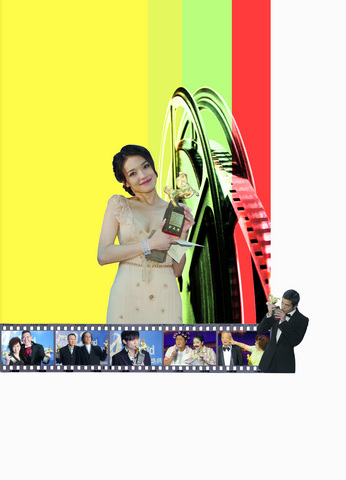Keelung shone in the limelight yesterday as the brightest stars in Chinese-language cinema gathered to attend the 42nd Golden Horse Awards (金馬獎).
But the biggest star on the night was Stephen Chow, whose film Kung Fu Hustle (功夫) took the Best Feature Film and also gave Chow (周星馳) his first Best Director Award. Kung Fu Hustle swept five award categories -- including Best Director, Best Feature Film, Best Supporting Actress, Best Make up and Costume Design and Best Visual.
The Wayward Cloud (天邊一朵雲) director Tsai Ming-liang (

PHOTOS: TAIPEITIMES AND AGENCIES
Aaron Kwok (郭富城) picked up the Best Leading Actor award for Divergence (三岔口), beating out fellow contender Tony Leung (梁家輝). In his 14 years of acting it was Kwok's first time to get nominated -- and he won. Apparently stunned by the sudden honor, the actor thanked everybody who had supported him over the years and said he was glad that he never gave up acting.
A tight contest among the leading actresses resulted in a flood of tears, from Best Leading Actress, Shu Qi (舒淇), who then read out a long thank-you list on stage.
The Best Taiwan Film Professional of the Year and the Best Taiwan Film of the Year went to Hou Hsiao-hsien (侯孝賢) and his film Three Times (最好的時光). It was more like a gesture of consolation for the film's failure to take home neither the Best Director nor the Best Feature Film award.
The pop star Jay Chou (周杰倫) earned his spurs as an actor by picking up the Best New Performer award for his role in Initial D.
"It really came as a surprise. I'm really happy and the award really means a lot to me. For a moment, I felt like my soul got separated from my body. And it was my spirit that went on stage to receive the award while my body was still in the seat," a modest Chou said after accepting his award.
A frequent winner at the Golden Horse, Anthony Wong (黃秋生), ignited a big round of applause when the presenters announced he was the winner in the Best Supporting Actor category for Initial D (頭文字D).
Having previously won the same award twice for his roles in Infernal Affairs (無間道) and Princess D (想飛), Wong said he was chuffed at winning again this year because "the competition in the category was truly fierce this year." Wong also expressed gratitude to his assistant who "dutifully supplies me with liquor so that I can stay in character."
Hong Kong veteran actress Yuen Qiu (元秋) beat out local talents Liu Yi-jing (
Supporting Actress for her role in Kung Fu Hustle. Though she is a first-time Golden Horse winner, Yuen appeared composed when receiving her award.
"I want to thank Stephen Chow. I learned a lot from him during the shooting of the film," she said. When asked how she would prepare for the sequel, the actress replied, "I have lost some weight so I'll just have to put another 20 pounds (9kg)."
Taiwanese movies scored well in this year's musical categories. First time nominee Lee Cin-cin (李欣芸) was taken by surprise when he was honored with the Best Original Film Score award for Blue Cha-Cha (深海). Another dark horse who did well was James Ho (何俊明), who took home the Best Original Film Song trophy for documentary Jump! Boys (翻滾吧!男孩). The film was also honored with the Best Documentary award, as expected.
The Lifetime Achievement award this year went to 88-year-old Ke Hsiang-ting (葛香亭), who was given the best leading actor accolade twice at the Golden Horse for his portrayal of down-to-earth father figures in Old Tradition New Technologies (養鴨人家, 1965) and Kao Shan Ching (高山青, 1970). Ke began performing in films in the 1940s and has made over 176 movies, in addition to many TV dramas and theatrical plays.
A big surprise last night was the success of the local production How's Life? (生命狂想曲) in the Best Short Film award category; while The Fire Ball (火焰山) took Best Animation. The award represents long overdue recognition for the lea-ding Taiwanese animation company Wang Films (宏廣動畫), which has been doing sterling work for the past 27 years.
The constellation of stars gathered in Keelung included Taiwan's Ang Lee (李安) -- who took a break from his schedule promoting Brokeback Mountain (斷背山). Also treading the red carpet were Hong Kong director Tsui Hark (徐克), French star Romain Duris and Barrie Osborne, producer of The Lord of the Rings and The Matrix and Face/Off.

Last week the story of the giant illegal crater dug in Kaohsiung’s Meinong District (美濃) emerged into the public consciousness. The site was used for sand and gravel extraction, and then filled with construction waste. Locals referred to it sardonically as the “Meinong Grand Canyon,” according to media reports, because it was 2 hectares in length and 10 meters deep. The land involved included both state-owned and local farm land. Local media said that the site had generated NT$300 million in profits, against fines of a few million and the loss of some excavators. OFFICIAL CORRUPTION? The site had been seized

Next week, candidates will officially register to run for chair of the Chinese Nationalist Party (KMT). By the end of Friday, we will know who has registered for the Oct. 18 election. The number of declared candidates has been fluctuating daily. Some candidates registering may be disqualified, so the final list may be in flux for weeks. The list of likely candidates ranges from deep blue to deeper blue to deepest blue, bordering on red (pro-Chinese Communist Party, CCP). Unless current Chairman Eric Chu (朱立倫) can be convinced to run for re-election, the party looks likely to shift towards more hardline

Sept. 15 to Sept. 21 A Bhutanese princess caught at Taoyuan Airport with 22 rhino horns — worth about NT$31 million today — might have been just another curious front-page story. But the Sept. 17, 1993 incident came at a sensitive moment. Taiwan, dubbed “Die-wan” by the British conservationist group Environmental Investigation Agency (EIA), was under international fire for being a major hub for rhino horn. Just 10 days earlier, US secretary of the interior Bruce Babbitt had recommended sanctions against Taiwan for its “failure to end its participation in rhinoceros horn trade.” Even though Taiwan had restricted imports since 1985 and enacted

The depressing numbers continue to pile up, like casualty lists after a lost battle. This week, after the government announced the 19th straight month of population decline, the Ministry of the Interior said that Taiwan is expected to lose 6.67 million workers in two waves of retirement over the next 15 years. According to the Ministry of Labor (MOL), Taiwan has a workforce of 11.6 million (as of July). The over-15 population was 20.244 million last year. EARLY RETIREMENT Early retirement is going to make these waves a tsunami. According to the Directorate General of Budget Accounting and Statistics (DGBAS), the